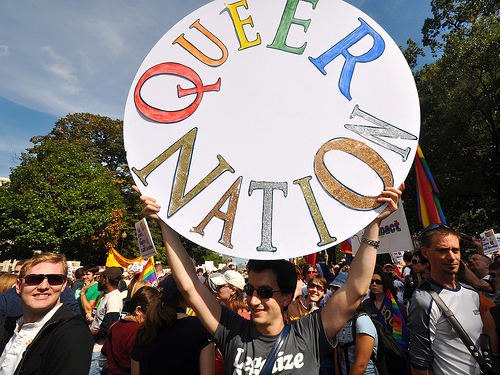Part of postmodernism is a reaction to modernism. In ways, it subsumed aspects of modernism into the dominant culture so that what was once fairly radical has become regularized.
But prof started this discussion with the distinction that:
To be honest, pomo is kind of a downer a lot of the time. I respect it, but I think part of the reaction has been a yearning for praxis, how do you live or performatively enact this discourse? Yes, there's a lot of writing but when does this become practice?
I know this is happening, with Queer Theory when I go to events by the LGBT/Queer groups on campus we inevitably introduce ourselves and our preferred gender pronouns. This conception of gender as being separate from sex, attempting to subvert assigned, socialized assumptions of gender prescribed onto living bodies by performatively announcing our preferred gender, finds its origins in a Butlerian model of gender that questions the construction of a binary gender systems and "compulsory heterosexuality."
But prof started this discussion with the distinction that:
- Modernism = ~1914-1960
- Postmodernism = 1945 or 1960 - Present
- But the present isn't quite postmodernism. Postmodernism has been around for a while and with advances in culture/society and technology our current situation could better be better described as digital culture, media & technology, atemporality or even post-postmodernism
To be honest, pomo is kind of a downer a lot of the time. I respect it, but I think part of the reaction has been a yearning for praxis, how do you live or performatively enact this discourse? Yes, there's a lot of writing but when does this become practice?
I know this is happening, with Queer Theory when I go to events by the LGBT/Queer groups on campus we inevitably introduce ourselves and our preferred gender pronouns. This conception of gender as being separate from sex, attempting to subvert assigned, socialized assumptions of gender prescribed onto living bodies by performatively announcing our preferred gender, finds its origins in a Butlerian model of gender that questions the construction of a binary gender systems and "compulsory heterosexuality."
Or as was brought up in class, the entire construct of "hipster culture" is uniquely (ha) postmodern. It is based in a kind of nostalgia while maintaining a false pretext of being hyper-individualistic and original.
Often, it's subtle, but we've found aspects of that application. It's just the discourse used to describe it has to catch up, which is hard when you're working with what I would call a kind of meta-theory.
I'm sure I'll have more on this later, but this is a start.

